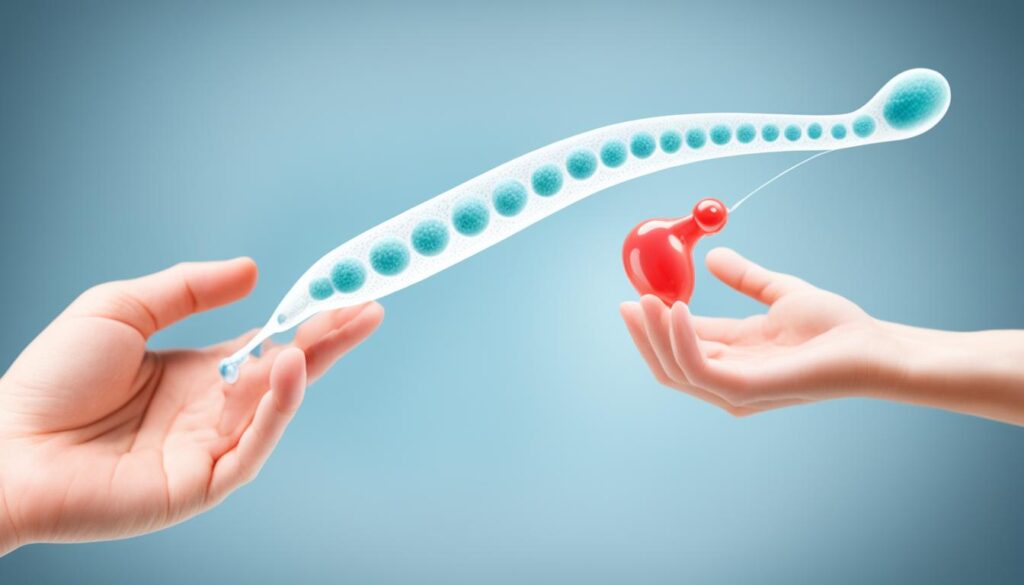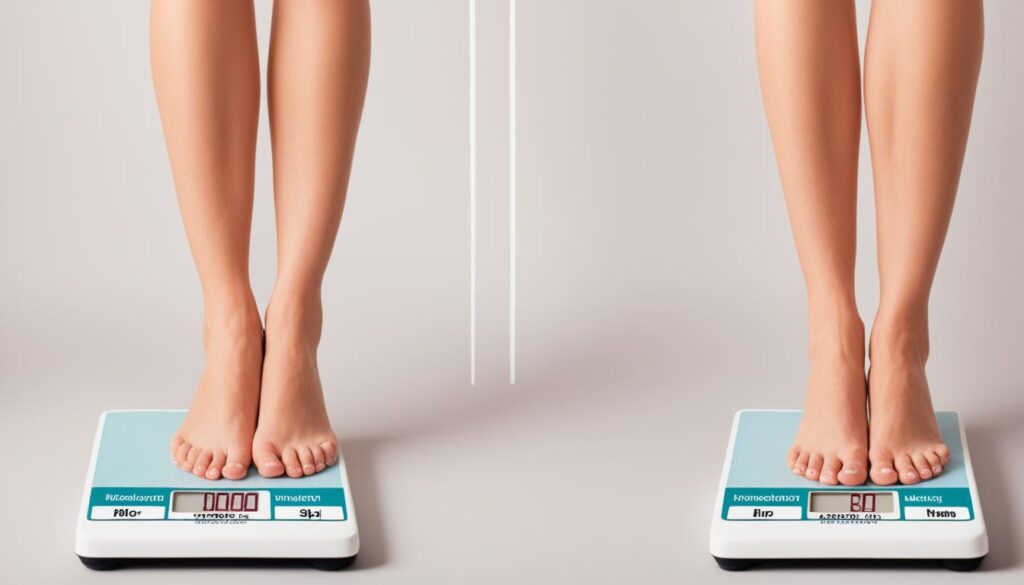Did you know that there is a common belief that masturbation can increase estrogen levels in the body? However, is this claim based on scientific evidence? Let’s dive into the research and uncover the truth behind the effects of masturbation on estrogen levels.
Many individuals speculate that masturbation can disrupt hormone balance and lead to hormonal imbalances in the body. But before we jump to any conclusions, it’s essential to understand the scientific facts surrounding this topic. Keep reading to find out if there is any truth to the idea that self-pleasure impacts estrogen levels and overall hormone balance.
Hormonal Imbalance and Masturbation: Debunking the Myths
Contrary to popular belief, there is no direct relationship between masturbation and estrogen production. Engaging in sexual activity, including self-stimulation, does not cause a significant increase in estrogen levels. Estrogen, a vital hormone in females, is primarily produced in the ovaries and its levels naturally fluctuate throughout the menstrual cycle.
While sexual activity may stimulate the release of hormones, the influence on estrogen levels is minimal and not clinically significant. It is crucial to understand that hormonal imbalance can be caused by various factors, such as pregnancy, polycystic ovary syndrome (PCOS), menopause, thyroid disorders, and certain medications. Excessive alcohol consumption and a high-sugar diet can also disrupt hormone balance. However, masturbation itself is not a direct cause of hormonal imbalance.
Estrogen plays a crucial role in the female reproductive system and overall health. It regulates the menstrual cycle, supports bone health, and affects mood and cognitive function. Any concerns about hormonal balance or disruptions should be addressed by consulting with a healthcare professional who can provide appropriate guidance and support.
“It’s a common misconception that masturbation can directly impact estrogen levels. Scientific evidence does not support this claim. Hormonal imbalances are complex and can be influenced by various factors, but masturbation is not one of them.” – Dr. Samantha Walker, Endocrinologist
Understanding Estrogen and Its Importance
Estrogen is a vital hormone in the female body, serving a range of functions beyond reproductive health. It plays a crucial role in:
- Regulating the menstrual cycle
- Maintaining vaginal health and lubrication
- Supporting bone density and strength
- Affecting mood and cognitive function
“Estrogen is essential for maintaining overall health in females. While sexual activity, including masturbation, can influence hormone release, estrogen levels are affected minimally and not in a clinically significant manner.” – Dr. Emily Harper, Gynecologist
Understanding Hormonal Imbalance in Females
Hormonal imbalance in females can occur due to various factors, including the changing levels of progesterone and estrogen. Throughout the natural menstrual cycle, these hormones undergo regular fluctuations. During the follicular phase, estrogen levels increase, while progesterone levels remain relatively low. After ovulation, progesterone levels rise, while estrogen levels decrease. These natural changes in hormone levels can sometimes result in symptoms of hormonal imbalance.
Common symptoms of hormonal imbalance include:
- Lack of energy
- Mood swings
- Weight gain
- Irritability
- Depression
- Premenstrual syndrome (PMS)
If you experience persistent or worsening symptoms, it is advisable to consult a medical professional for a proper diagnosis and appropriate treatment.
| Common Symptoms of Hormonal Imbalance | Possible Causes |
|---|---|
| Lack of energy | Fluctuating progesterone and estrogen levels |
| Mood swings | Unbalanced hormone production |
| Weight gain | Estrogen dominance or thyroid disorders |
| Irritability | Changes in progesterone levels |
| Depression | Decreased serotonin levels |
| Premenstrual syndrome (PMS) | Fluctuating hormone levels during the menstrual cycle |
It is important to remember that maintaining overall hormonal balance involves many factors, such as lifestyle, diet, stress management, and proper medical care. Consultation with a healthcare professional can provide valuable guidance and support for managing hormonal imbalances and their associated symptoms.
Debunking the Myth of Masturbation and Hormonal Imbalance
Masturbation is a natural and healthy sexual activity that has been the subject of many misconceptions, including its impact on hormone balance. It is important to clarify that masturbation does not cause hormonal imbalance or significantly affect hormone levels in the body. This belief is not supported by scientific evidence.
While it is true that sexual activity, including masturbation, can stimulate the release of certain hormones, such as oxytocin, endorphins, and dopamine, the effects on overall hormone levels are minimal and not clinically significant. Hormonal balance is influenced by various factors, including the body’s natural processes, genetics, lifestyle choices, and other medical conditions. Masturbation is not considered a direct cause of hormonal imbalance.
The claim that masturbation increases estrogen levels is particularly common. However, research indicates that there is no significant relationship between masturbation and elevated estrogen levels. Estrogen is mostly produced in the ovaries and undergoes natural fluctuations throughout the menstrual cycle. While sexual activity may temporarily affect hormone levels, these changes are brief and do not cause long-term imbalances.
To further emphasize this point, refer to the following table:
| Hormone | Effect of Masturbation |
|---|---|
| Estrogen | No significant increase |
| Testosterone | Temporary boost in some individuals |
| Cortisol | Temporary decrease |
As shown in the table, there is no substantial impact on estrogen levels due to masturbation. Temporary increases in testosterone, primarily in individuals with higher baseline levels, are short-lived and do not lead to hormonal imbalances. Additionally, cortisol levels tend to decrease temporarily, potentially contributing to a sense of relaxation and stress relief.
It is crucial to understand that hormonal imbalances can be caused by various factors, such as pregnancy, polycystic ovary syndrome (PCOS), menopause, thyroid disorders, and certain medications. Lifestyle factors like excessive alcohol consumption and a high-sugar diet can also affect hormone balance. If you have concerns about hormonal imbalance, it is best to consult with a healthcare professional who can provide a comprehensive evaluation and appropriate guidance.
In conclusion, masturbation does not cause hormonal imbalance or significantly affect hormone levels. It is a healthy and natural sexual activity that can be enjoyed without concerns about its impact on hormone balance. Hormonal imbalances are complex and can result from a range of factors unrelated to masturbation. It is always important to prioritize overall health and well-being, and consulting with a medical professional is advisable if you have specific concerns about your hormone levels.
The Relationship Between Masturbation and Reproduction

While masturbation is a common and healthy sexual activity, it does not directly impact reproduction or fertility. Contrary to popular myths, orgasms achieved through masturbation do not eject eggs into the fallopian tubes or affect ovulation. In humans, ovulation occurs as part of the natural menstrual cycle and does not require sexual arousal or intercourse.
Therefore, masturbation has no potential effects on ovulation, which is crucial for conception. It is important to understand that fertility can be influenced by various factors such as age, hormonal balance, and reproductive health. If you are concerned about fertility or experiencing difficulties conceiving, it is recommended to consult with a healthcare professional who can provide personalized guidance and support.
It is important to note that while masturbation does not directly impact fertility, there are other factors that can affect reproductive health. These factors may include underlying medical conditions, lifestyle choices, and overall well-being. Maintaining a healthy lifestyle, such as maintaining a balanced diet, exercising regularly, and managing stress, can contribute to optimal reproductive health.
Remember, each individual’s fertility journey is unique, and it is important to seek professional advice when needed. Being informed about reproductive health and seeking appropriate medical care can help you make informed decisions and take steps towards achieving your desired reproductive goals.
Masturbation and Sexual Satisfaction
When it comes to sexual satisfaction, masturbation is one of the activities that can contribute to enhancing pleasure and fulfilling desires. The release of certain hormones during sexual activity, including masturbation, can significantly impact your overall experience.
Oxytocin, often referred to as the “cuddle hormone,” is released during sexual arousal and orgasms. This hormone plays a crucial role in promoting feelings of intimacy, trust, and happiness. It can enhance the connection between partners or even create a sense of self-contentment during solo exploration.
Prolactin, another hormone released during sexual activity, is also associated with pleasure and satisfaction. It is involved in regulating sexual gratification and orgasm. The release of prolactin can intensify the pleasure experienced during masturbation, leading to a more fulfilling sexual experience.
While estrogen, a primary female sex hormone, plays a crucial role in sexual desire and arousal, its exact effects on masturbation are not extensively studied. Estrogen levels naturally fluctuate during different stages of the menstrual cycle, affecting sexual desire and responsiveness. However, the specific influence of estrogen on masturbation remains a topic that requires further investigation.
It is important to understand that sexual satisfaction is highly individual and can vary greatly from person to person. Everyone has different preferences, desires, and needs when it comes to sexual experiences, including masturbation. What providing immense pleasure for one person might not have the same effect on another.
| Hormone | Effect on Masturbation |
|---|---|
| Oxytocin | Promotes feelings of intimacy, trust, and happiness. |
| Prolactin | Enhances pleasure and satisfaction. |
| Estrogen | The specific effects on masturbation are still being studied. |
Remember that exploring your sexual preferences, desires, and practices is a personal journey. While hormones can contribute to sexual satisfaction, the true enjoyment lies in understanding yourself and what brings you pleasure. Whether it’s through masturbation or other sexual activities, prioritize your own comfort, consent, and emotional well-being.
Health Benefits of Masturbation
Masturbation offers numerous health benefits that can contribute to your overall well-being. Engaging in sexual activity, including self-pleasure, has been found to have positive effects on various aspects of your health.
Reduces Stress Levels
One of the key benefits of masturbation is its ability to reduce stress levels. Sexual activity releases endorphins in your brain, which are natural mood lifters and can help alleviate stress and anxiety. Taking some time for yourself to engage in self-pleasure can be a great way to relax, unwind, and reduce the stress accumulated throughout the day.
Improves Self-Esteem
Masturbation can also have a positive impact on your self-esteem. When you engage in self-pleasure, you become more in tune with your body and its responses. This increased self-awareness can help boost your confidence and body image, fostering a sense of self-acceptance and empowerment.
Enhances Cardiovascular Health
Regular sexual activity, including masturbation, has been linked to improved cardiovascular health. During arousal and orgasm, your heart rate increases, and blood circulation improves. This increased blood flow helps to keep your cardiovascular system healthy and can reduce the risk of heart disease and other cardiovascular conditions.
Protects Against Vaginal Atrophy
Masturbation can be particularly beneficial for women going through menopause. As estrogen levels decline during this stage of life, vaginal atrophy (thinning and dryness of vaginal tissues) can occur, leading to discomfort and pain during sexual intercourse. Masturbation can help increase blood flow to the vaginal area, promoting lubrication and maintaining vaginal health.
“Protective” Against Sexual Dysfunction
Studies have shown that regular masturbation can be “protective” against sexual dysfunction. By engaging in self-pleasure, you can improve your sexual response and maintain sexual function. It provides an opportunity to explore your desires, preferences, and fantasies, leading to a more fulfilling and satisfying sexual experience.
It’s important to remember that individual experiences and preferences may vary when it comes to masturbation. Consent, communication, and personal comfort should always be prioritized in sexual activities, including self-pleasure.
Debunking Myths About Masturbation and Pregnancy
Masturbation is generally safe during pregnancy. You can continue to engage in sexual activities, including masturbation, as long as you do not experience any complications and have not been advised otherwise by your healthcare provider. It’s important to prioritize your comfort and listen to your body’s needs during this time.
Contrary to common misconceptions, orgasms induced by masturbation do not cause harm to the developing fetus. In fact, orgasms can be experienced throughout pregnancy without triggering labor. The muscles contract during an orgasm, but this does not pose any risk to your baby.
Remember, every pregnancy is unique, and individual circumstances may vary. It is always recommended to consult with your healthcare provider if you have any concerns or specific medical conditions that require attention.
Busting the Myth: Sexual Activity and Labor Induction
“There is no evidence to suggest that sexual activity, including masturbation, can induce labor. While orgasms can cause uterine contractions, they are typically mild and subside without causing any harm to the baby or triggering preterm labor.”
Your healthcare provider can provide personalized guidance based on your medical history and specific needs. Feel free to discuss any worries or questions you may have. Prioritizing open communication and addressing your concerns will ensure a safe and enjoyable pregnancy experience.
Exploring Your Sexual Needs during Pregnancy
Pregnancy can affect your sexual desires and preferences. Some women may experience increased libido, while others may have a decreased interest in sexual activity. Both responses are normal and can be influenced by hormonal changes, physical discomfort, emotional factors, and personal preferences.
Remember to listen to your body and communicate with your partner about your needs and desires. Open and honest communication will help foster intimacy and ensure a fulfilling sexual experience during this transformative time.
It’s worth noting that certain conditions, such as placenta previa or a history of preterm labor, may require modifications to sexual activity. Your healthcare provider will provide guidance specific to your situation to ensure the well-being of both you and your baby.
Benefits of Masturbation during Pregnancy
Masturbation can offer various benefits during pregnancy. It can help you explore your body and maintain a connection with your sexuality. Additionally, self-pleasure can promote relaxation, reduce stress, and enhance overall well-being. Exploring your own pleasure can be a positive and empowering experience as you embrace the changes happening within your body.
However, if you experience pain, discomfort, or any abnormalities during or after masturbation, it’s important to seek medical advice. Your healthcare provider can address any concerns and provide appropriate guidance.
| Myth | Reality |
|---|---|
| Masturbation can harm the developing fetus | No, masturbation does not pose any risk to the baby |
| Orgasms induced by masturbation can trigger preterm labor | No, mild uterine contractions during orgasms are normal and subside without causing harm |
| Sexual activity, including masturbation, can induce labor | No scientific evidence supports this claim |
Remember, every pregnancy is unique, and it’s important to prioritize your physical and emotional well-being. If you have any concerns or questions regarding sexual activity during pregnancy, consult with your healthcare provider for personalized guidance.
Hormonal Responses During Masturbation
Masturbation can have an impact on hormonal responses in the body. When you engage in sexual arousal and experience orgasm through masturbation, certain hormones are affected, including testosterone and cortisol. While the immediate effects of these hormone fluctuations are temporary, their long-term impact is not yet fully understood.
After sexual activity, including masturbation, testosterone levels may temporarily increase. Testosterone is a hormone primarily associated with male sexual characteristics but is also present in females. However, it’s important to note that the exact extent to which testosterone levels are influenced by masturbation is still being studied.
On the other hand, cortisol, which is a stress hormone, may be temporarily lowered after sexual activity, including masturbation. This can contribute to a sense of relaxation and overall well-being. However, it’s worth noting that the duration and significance of these cortisol reductions may vary among individuals. It’s important to prioritize your personal comfort and overall well-being when engaging in sexual activities.
Overall, while masturbation can trigger hormonal responses in the body, more research is needed to fully understand the long-term effects of these hormone fluctuations. Individual hormonal responses during masturbation can vary, and what works for one person may not be the same for another. It’s important to listen to your body, prioritize your comfort, and make choices that align with your overall well-being.
Masturbation and Hormone Balance: The Bottom Line

Masturbation is a natural and pleasurable sexual activity that many individuals engage in. But does it have any impact on hormone levels? Let’s find out.
While sexual activity, including masturbation, can stimulate the release of certain hormones, the effects on hormone levels are minimal and not clinically significant. Hormones are chemical messengers that regulate various bodily functions, including sexual desire, reproduction, and mood.
Research suggests that the impact of self-pleasure on hormone levels is not substantial enough to cause hormonal imbalance. Hormonal imbalances can occur due to various factors, such as pregnancy, menopause, thyroid disorders, and certain medications. However, masturbation is not considered a direct cause of hormonal imbalance.
It is important to prioritize comprehensive healthcare and consult with a medical professional if you have concerns about hormonal balance or reproductive health. Your doctor can provide personalized advice and guidance based on your specific needs and circumstances.
Remember, masturbation is a normal and healthy sexual activity that can bring pleasure and satisfaction. It is essential to prioritize your own comfort, consent, and well-being when engaging in any form of sexual activity, including self-pleasure.
Benefits of Masturbation:
Masturbation offers various health benefits, both physical and emotional. Here are a few benefits of engaging in self-pleasure:
- Reduces stress levels
- Improves self-esteem and body image
- Enhances cardiovascular health
- May help protect against vaginal atrophy in women going through menopause
- Can contribute to overall sexual and reproductive health
It is important to note that individual experiences and preferences may vary. If you have any concerns or questions about masturbation or its impact on your health, do not hesitate to consult with a healthcare professional.
“Masturbation is the safest sex you’ll ever have.”
Hormonal Responses During Masturbation:
During sexual arousal and orgasm, certain hormones may be momentarily affected. For example, testosterone levels may increase temporarily after sexual activity, including masturbation. However, the long-term effects of these temporary hormone fluctuations are not well understood.
On the other hand, cortisol, a stress hormone, may be temporarily lowered after sexual activity. This may contribute to the relaxation and sense of well-being that many individuals experience after masturbation.
It is important to remember that hormonal responses during masturbation can vary from person to person. It is always best to prioritize your own comfort, pleasure, and well-being when engaging in any sexual activity.
| Hormone | Effect on Masturbation |
|---|---|
| Testosterone | May temporarily increase after sexual activity |
| Cortisol | May temporarily decrease after sexual activity |
As shown in the table above, there may be temporary changes in hormone levels during masturbation. However, these changes are not considered significant enough to have a substantial impact on overall hormone balance.
In summary, masturbation does not have a significant impact on hormone balance. While sexual activity, including masturbation, can stimulate the release of certain hormones, the effects on hormone levels are minimal and not clinically significant. It is important to prioritize comprehensive healthcare and consult with a medical professional if you have concerns about hormonal balance or reproductive health.
Conclusion
In conclusion, scientific evidence does not support the claim that masturbation increases estrogen levels. Masturbation is a natural and healthy sexual activity that does not have a significant impact on hormone levels or cause hormonal imbalance. While hormonal imbalance can be caused by various factors, masturbation is not considered a direct cause. It’s important to prioritize comprehensive healthcare, including regular check-ups, and consult with a healthcare professional if you have concerns about hormone balance or reproductive health.
Remember that sexual activities, including masturbation, can have different effects and experiences for each individual. What matters most is prioritizing consent, communication, and personal comfort in your sexual activities. Your well-being should always be the top priority, and seeking professional medical advice when necessary is highly recommended.
Overall, embrace your sexual health and explore it in a way that feels right for you. Masturbation can offer various mental and physical health benefits, such as stress reduction, improved self-esteem, and enhanced sexual satisfaction. Enjoy the pleasure it brings while knowing that it does not significantly impact your hormone levels or cause hormonal imbalance.
FAQ
Does masturbation increase estrogen?
No, there is no scientific evidence to support the claim that masturbation increases estrogen levels.
What are the effects of masturbation on estrogen levels?
Masturbation has minimal effects on estrogen levels and does not have a significant impact on overall hormone balance.
Is there an impact of self-pleasure on estrogen production?
No, there is no direct relationship between masturbation and estrogen production.
Does sexual activity influence estrogen levels?
While sexual activity, including masturbation, may stimulate the release of certain hormones, the effects on estrogen levels are minimal and not clinically significant.
What is the relationship between masturbation and hormone balance?
Masturbation does not cause hormone imbalance. It is a natural and healthy sexual activity that does not significantly affect hormone levels.
Can masturbation affect fertility?
No, masturbation does not directly impact reproductive health or fertility.
How does estrogen affect masturbation?
The effects of estrogen on masturbation are not well-studied. Sexual satisfaction can vary greatly from person to person.
What are the health benefits of masturbation?
Masturbation can reduce stress levels, improve self-esteem, and enhance cardiovascular health. It may also help protect against vaginal atrophy in women going through menopause.
Can I masturbate during pregnancy?
Yes, masturbation is generally safe during pregnancy. However, it is always important to consult with your healthcare provider for any specific concerns or medical conditions.
How do hormones respond during masturbation?
Hormones such as testosterone and cortisol may be momentarily affected during sexual arousal and orgasm, but the long-term effects are not well understood.
Does masturbation impact hormone balance?
Masturbation does not have a significant impact on hormone balance. Hormonal imbalance can be caused by various factors, but masturbation is not considered a direct cause.






